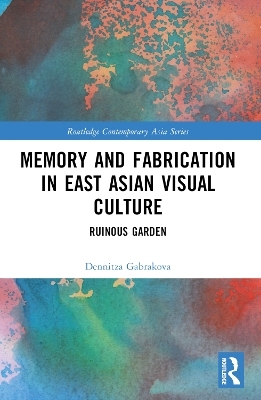
Memory and Fabrication in East Asian Visual Culture
Ruinous Garden
Seiten
2024
Routledge (Verlag)
978-1-032-10200-9 (ISBN)
Routledge (Verlag)
978-1-032-10200-9 (ISBN)
This book examines four contemporary sites of visual culture in East Asia through the poetic prism of the "ruinous garden".
This book examines four contemporary sites of visual culture in East Asia through the poetic prism of the “ruinous garden.”
Framing destroyed, discarded, and displaced material objects within a rhetoric of development and relating this to the experience of ethnic/national culture, the book presents succinct analyses of visual works, as well as cultural criticisms, centered on space in metropolitan Japan and Hong Kong, China. These analyses are placed in dialog with approaches from postcolonial texts, addressing development and fractures in representation. Additionally, the book suggests graphic design as a form of retrospective cultural thinking, encompassing visual and invisible modernity, as well as an attachment to disappearing space.
Offering a unique and thorough analysis of Japanese visual culture, combining discussion on photography, installation art, and graphic design, as well as integrating material from Hong Kong visual culture in discussions of identity, this book will appeal to students and scholars of visual culture in East Asia, environmental art, and environmental humanities.
This book examines four contemporary sites of visual culture in East Asia through the poetic prism of the “ruinous garden.”
Framing destroyed, discarded, and displaced material objects within a rhetoric of development and relating this to the experience of ethnic/national culture, the book presents succinct analyses of visual works, as well as cultural criticisms, centered on space in metropolitan Japan and Hong Kong, China. These analyses are placed in dialog with approaches from postcolonial texts, addressing development and fractures in representation. Additionally, the book suggests graphic design as a form of retrospective cultural thinking, encompassing visual and invisible modernity, as well as an attachment to disappearing space.
Offering a unique and thorough analysis of Japanese visual culture, combining discussion on photography, installation art, and graphic design, as well as integrating material from Hong Kong visual culture in discussions of identity, this book will appeal to students and scholars of visual culture in East Asia, environmental art, and environmental humanities.
Dennitza Gabrakova is Senior Lecturer in Japanese Studies at Victoria University of Wellington, New Zealand. Ruinous Garden is the final book of her literary and visual trilogy on developmentalism, including The Dream of Weeds (in Japanese, 2012) and The Unnamable Archipelago (2018).
1. Debris of Identity: Visions of Japan and Images of Hong Kong 2. The Hedges of Brightness: Yanobe Kenji’s Adventure 3. The Violence of Disappearance: Hong Kong’s Dislocation 4. The Dislocation of Development: Toda Tsutomu’s Graphic Design 5. Between Memory and Fabrication
| Erscheinungsdatum | 05.10.2022 |
|---|---|
| Reihe/Serie | Routledge Contemporary Asia Series |
| Zusatzinfo | 18 Halftones, black and white; 18 Illustrations, black and white |
| Verlagsort | London |
| Sprache | englisch |
| Maße | 156 x 234 mm |
| Gewicht | 335 g |
| Themenwelt | Kunst / Musik / Theater ► Kunstgeschichte / Kunststile |
| Geisteswissenschaften ► Geschichte ► Regional- / Ländergeschichte | |
| Sozialwissenschaften ► Ethnologie | |
| Sozialwissenschaften ► Soziologie ► Spezielle Soziologien | |
| ISBN-10 | 1-032-10200-4 / 1032102004 |
| ISBN-13 | 978-1-032-10200-9 / 9781032102009 |
| Zustand | Neuware |
| Informationen gemäß Produktsicherheitsverordnung (GPSR) | |
| Haben Sie eine Frage zum Produkt? |
Mehr entdecken
aus dem Bereich
aus dem Bereich
Erinnerungen
Buch | Softcover (2024)
Pantheon (Verlag)
CHF 22,40


